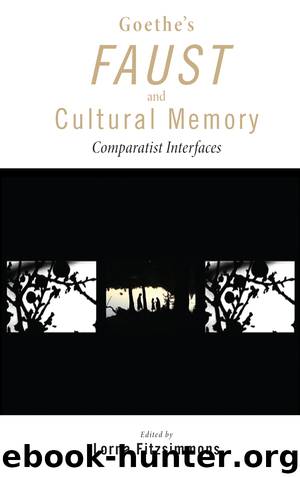Goethe's Faust and Cultural Memory by Fitzsimmons Lorna;

Author:Fitzsimmons, Lorna; [Fitzsimmons, Lorna]
Language: eng
Format: epub
Publisher: Lehigh University Press
Published: 2012-03-14T16:00:00+00:00
Two observations spring immediately to mind. Several of these titles, and indeed the contents of the essays, justify the assumption that Steiner’s thinking and the movement he founded are essentially Christian, even if he insisted the contrary. Then, oddly, although a number of the essays obviously deal directly with themes and parts of Faust, this list excludes the Gretchen figure, the social issues surrounding her death, and indeed the greater socio-economic and historical problems that surface in part two, the questions that attract the attention of most modern Faust theater directors, audiences, and scholars. The volume’s editors, Edwin Froböse and Hans Erhard Lauer, supplied no footnotes or critical apparatus that could connect it with these aspects.
The second volume concentrates on Faust II and contains the texts of twelve Steiner lectures given in Dornach between September 1916 and January 1919, with one more in Prague, June 1918. As was the case with the first volume, the dating and location are striking. It was the height of the war, yet removed from the field of battle. The volume is marked by the same escapism that allowed the author to continue his thoroughly optimistic worldview and interpretation of Faust, and the overall approach continues to be consistent with the tenets of the late nineteenth- and early twentieth-century humanistic view of the world. The editors, Lauer and Froböse, included eight pages of notes, but the scholarly apparatus is sparse.30 The notes cite two scholars, Adolf von Harnack (1851–1930), with whom Steiner feuded, and Karl Julius Schröer (1825–1900), whose scholarship became the basis of the critical notes to Proskauer’s anthroposophically sanctioned edition of Goethe’s primary text. Schröer, a dialect researcher, cultural historian, idealist, and professor at the Technical University of Vienna, greatly influenced Steiner when he studied there between October 1879 and August 1883, albeit without completing final examinations in any discipline. Schröer in fact had suggested the young Steiner as co-editor for the Goethe volumes in the Weimar Edition31 and was later acknowledged by his protegé as responsible for bringing him to see Goethe’s Faust as the highest expression of optimism in mankind, a belief Steiner would nurture for life. Later, Steiner recognized him thus: “I thank God and good fortune that here in Vienna I met a man who—after Goethe, of course—can call himself the world’s best Faust expert, a man whom I regard highly and respect as a teacher, scholar, poet, and human being” (“Ich danke es Gott und einem guten Geschicke, daß ich hier in Wien einen Mann kennenlernte, der – nach Goethe selbstverständlich – sich als der beste Faustkenner rühmen darf, einen Mann, den ich hochschätze und verehre als Lehrer, als Gelehrten, als Dichter, als Menschen”).32 Contact with Schröer convinced Steiner that Goethe represented a high point of German culture which the German people no longer enjoyed. Yet he shared none of the fin-de-siècle pessimism of the time and carried Schröer’s idealism into Goetheanum productions to this very day. The experience also biased him forever in his interpretation. Scholarship from a different point of view is not represented in these volumes.
Download
This site does not store any files on its server. We only index and link to content provided by other sites. Please contact the content providers to delete copyright contents if any and email us, we'll remove relevant links or contents immediately.
The Rules Do Not Apply by Ariel Levy(4526)
Bluets by Maggie Nelson(4263)
Too Much and Not the Mood by Durga Chew-Bose(4096)
Pre-Suasion: A Revolutionary Way to Influence and Persuade by Robert Cialdini(3979)
The Motorcycle Diaries by Ernesto Che Guevara(3788)
Walking by Henry David Thoreau(3685)
What If This Were Enough? by Heather Havrilesky(3199)
Schaum's Quick Guide to Writing Great Short Stories by Margaret Lucke(3189)
The Daily Stoic by Holiday Ryan & Hanselman Stephen(3111)
The Day I Stopped Drinking Milk by Sudha Murty(3106)
Why I Write by George Orwell(2776)
The Social Psychology of Inequality by Unknown(2768)
Letters From a Stoic by Seneca(2673)
A Short History of Nearly Everything by Bryson Bill(2511)
Insomniac City by Bill Hayes(2399)
Feel Free by Zadie Smith(2379)
A Burst of Light by Audre Lorde(2349)
Upstream by Mary Oliver(2273)
Behave: The Biology of Humans at Our Best and Worst by Robert M. Sapolsky(2176)
